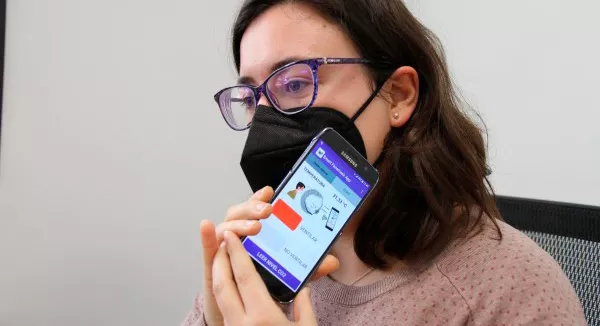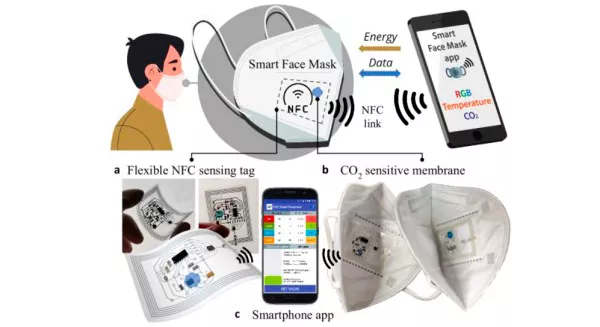With the rise of the omicron variant and the fear of its greater transmissibility, sales and use of FFP2 masks have risen again. Well, one of the downsides of using this mask format is that when we use FFP2-type masks, a concentration of carbon dioxide (CO2) is produced between the face and the mask that is higher than the ambient (~0.04%) due to exhaled gas. during breathing, the rebreathing of which can cause adverse health effects, even in healthy people, such as malaise, headache, fatigue, dyspnea, dizziness, sweating, increased heart rate, muscle weakness and drowsiness.
To try to solve this problem, scientists and engineers from the University of Granada (UGR) have developed and evaluated an intelligent FFP2 mask, which notifies the user by sending a message through their mobile phone when CO limits are exceededtwo recommended for health or permitted within it.
CO effectstwo that we rebreathe inside our mask
These negative effects are known to be related to both the duration of exposure and the concentration of the gas itself. As an example, some health regulations recommend a maximum value of 0.5% COtwo in the work environment (averaged over an 8-hour day), or that a 30-minute exposure to 4% CO is consideredtwo as very harmful to health.

“Since the declaration of a global pandemic by the World Health Organization (WHO) due to the spread of COVID-19, the universal use of masks has been recommended or imposed on the general population, in an effort to prevent rapid spread of SARS-CoV-2. Notwithstanding the widespread evidence in favor of masks to reduce community transmission, there is also broad agreement on the possible adverse effects caused by their prolonged use, mainly as a consequence of increased respiratory resistance and re-inhalation of CO.two located in that inner region of the mask”, point out the authors of this research.
Rebreathing of carbon dioxide between the face and the FFP2 mask can cause headache, fatigue, dizziness, dyspnea, or drowsiness.
The intelligent FFP2 mask designed at the UGR allows real-time determination of re-inhaled carbon dioxide using a mobile phone. This method represents a significant advance as a wearable system characterized by its low cost, scalability, reliability and comfort for monitoring magnitudes of interest for health.
This work, published in the prestigious journal Nature Communications, has been carried out by the multidisciplinary research team ECsens between the departments of Analytical Chemistry and Electronics and Computer Technology of the UGR, which have developed a portable detection system in real time and without battery for CO measurementtwo gaseous in said internal volume of the mask.
Sensors to measure parameters of interest
Although standard masks simply act as air filters for the nasal or oral passages, the integration of sensors to measure parameters of interest is considered an added value to improve their use and effectiveness, creating a new paradigm of smart masks.

“The system we propose consists of the inclusion, inside a standard FFP2 mask, of a flexible label made up of a CO sensortwo innovative optochemical of its own development together with all the signal processing electronics. Both have been printed on a light and flexible polymeric substrate, forming what is called a ‘sensor label’, without causing any discomfort for the user”, the authors point out. The manufactured tag does not use batteries, because it is wirelessly powered by the NFC communication link (the one used for wireless payment, for example) of a smartphone through an Android application. This app is also used for data processing, alert management, and display and sharing of results.
UGR scientists have carried out preliminary tests of this smart mask with subjects, both with sedentary activity and during physical exercise. “Our results, which are in line with previous clinical trials, provide values for COtwo between 2% during sedentary activities to maximum values of almost 5% during high intensity physical exercise. These values are significantly higher than the range of 0.04% – 0.1% COtwo held in open atmosphere or typical work environments considered healthy. Although the tests carried out do not constitute a formal clinical trial, their purpose is to give an idea of the potential of the system developed in the field of wearable sensors for non-invasive health monitoring”, the authors point out.

The scientists emphasize that this mask is 100% environmentally friendly, since it does not use batteries, and implements power wirelessly through the standard mobile phone.
All these characteristics reinforce the applications of the proposed low-cost device in the fields of non-invasive health monitoring, preclinical research, prognosis and diagnosis with portable electronic devices, and its use can be extended by including other sensors to monitor other magnitudes of interest.
Source: University of Granada
.






